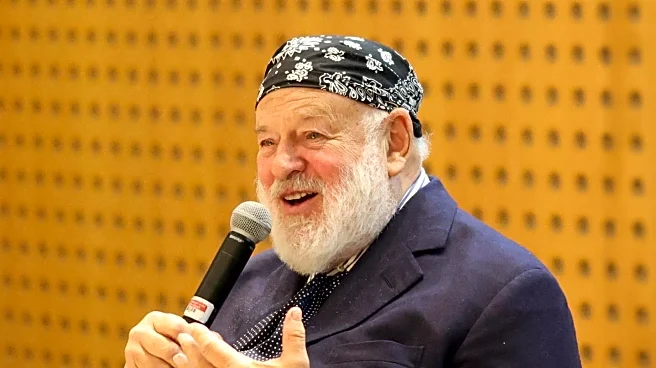What's Happening?
Rory Vaden, a New York Times bestselling author and co-founder of Brand Builders Group, is emphasizing the importance of channeling personal motivation into charitable donations to support global issues such as hunger, war-torn regions, and lack of clean
water. Vaden suggests that telling granular stories to highlight localized impact can inspire broader donations. He argues that philanthropy is the most mature form of motivation, surpassing competition and ambition. Vaden encourages individuals to choose causes that resonate personally, advocating for small, impactful contributions like those made through the Dollar Club initiative, which pools small donations to address specific community needs. He also highlights the importance of captivating storytelling and immediacy in promoting philanthropic causes.
Why It's Important?
Vaden's approach to philanthropy underscores the potential for personal motivation to drive significant charitable contributions. By focusing on individual stories and localized impact, his strategy aims to make philanthropy more relatable and compelling, potentially increasing engagement and donations. This method could lead to more effective fundraising efforts, benefiting various global and local causes. The emphasis on storytelling and immediacy could transform how charities communicate their missions, making them more accessible and emotionally resonant. Vaden's insights could inspire individuals and organizations to reevaluate their philanthropic strategies, potentially leading to increased support for critical issues like poverty, clean water access, and disaster relief.
What's Next?
Vaden's advocacy for storytelling in philanthropy may prompt charities to adopt more personalized communication strategies, focusing on individual narratives to engage donors. Organizations might explore new ways to leverage social media and digital platforms to share impactful stories quickly and widely. Additionally, Vaden's emphasis on small contributions could encourage more community-based initiatives like the Dollar Club, fostering grassroots support for local causes. As more individuals and companies embrace these strategies, there could be a shift towards more sustainable and impactful philanthropic efforts, potentially leading to increased funding for underrepresented issues and communities.
Beyond the Headlines
Vaden's approach highlights the ethical dimension of philanthropy, encouraging donors to give without fear or judgment of recipients' motives. This perspective challenges traditional views on charitable giving, promoting a more altruistic and inclusive approach. By advocating for emotional detachment from money, Vaden suggests that philanthropy can also serve as a catalyst for personal growth and financial intelligence. His insights may inspire a cultural shift towards viewing money as a tool for positive change rather than a source of security or identity.















